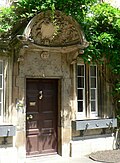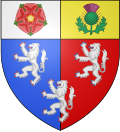Portal:University of Oxford
| Main page | Indices | Projects |
The University of Oxford portal
The University of Oxford is a collegiate research university in Oxford, England. There is evidence of teaching as early as 1096, making it the oldest university in the English-speaking world and the world's second-oldest university in continuous operation. It grew rapidly from 1167, when Henry II banned English students from attending the University of Paris. After disputes between students and Oxford townsfolk in 1209, some academics fled north-east to Cambridge where they established what became the University of Cambridge. The two English ancient universities share many common features and are jointly referred to as Oxbridge.
The University of Oxford is made up of thirty-nine semi-autonomous constituent colleges, four permanent private halls, and a range of academic departments which are organised into four divisions. Each college is a self-governing institution within the university, controlling its own membership and having its own internal structure and activities. All students are members of a college.
It does not have a main campus, but its buildings and facilities are scattered throughout the city centre. Undergraduate teaching at Oxford consists of lectures, small-group tutorials at the colleges and halls, seminars, laboratory work and occasionally further tutorials provided by the central university faculties and departments. Postgraduate teaching is provided in a predominantly centralised fashion.
Oxford operates the Ashmolean Museum, the world's oldest university museum; Oxford University Press, the largest university press in the world; and the largest academic library system nationwide. In the fiscal year ending 31 July 2023, the university had a total consolidated income of £2.92 billion, of which £789 million was from research grants and contracts.
Oxford has educated a wide range of notable alumni, including 30 prime ministers of the United Kingdom and many heads of state and government around the world. 73 Nobel Prize laureates, 4 Fields Medalists, and 6 Turing Award winners have matriculated, worked, or held visiting fellowships at the University of Oxford, while its alumni have won 160 Olympic medals. Oxford is the home of numerous scholarships, including the Rhodes Scholarship, one of the oldest international graduate scholarship programmes. (Full article...)
Selected article
The Principal and Fellows of Jesus College form the college's governing body. The Principal must be "a person distinguished for literary or scientific attainments, or for services in the work of education in the University or elsewhere", and has "pre-eminence and authority over all members of the College and all persons connected therewith". The Principal's Lodgings (entrance pictured) are in the first quadrangle of the college. The current Principal, Lord Krebs, was appointed in 2005 and is the 30th holder of the office. Professorial Fellows are those Professors and Readers of the university who are allocated to the college. One of these professorships is the Jesus Professor of Celtic, which is the only chair in Celtic studies at an English university. Official Fellows are those who hold tutorial or administrative appointments in the college. Past Official Fellows include the composer and musicologist John Caldwell, the historians Sir Goronwy Edwards and Niall Ferguson, the philosopher Galen Strawson and the political philosopher John Gray. There are also Senior and Junior Research Fellows. Principals and Fellows who retire can be elected as Emeritus Fellows. The college can also elect "distinguished persons" to Honorary Fellowships. (Full article...)
Selected biography
Selected college or hall
Pembroke College was founded in 1624 and named after William Herbert, 3rd Earl of Pembroke, who was Chancellor of the University at the time. Pembroke's coat of arms contains the English rose and Scottish thistle to represent King James I, in whose reign the college was founded, and three lions rampant from the arms of the Earl of Pembroke. The college was established on the site of a university hostel for law students dating from the 15th century, called Broadgates Hall, with money provided by Thomas Tesdale (a merchant from Abingdon) and Richard Wightwick (a Berkshire clergyman). It is located just to the south of the city centre, opposite Christ Church. It has gradually expanded in size, with further buildings added in the 18th, 19th and 20th centuries. There are about 400 undergraduates and about 120 postgraduates. Alumni include the lexicographer Samuel Johnson (although he did not complete his degree because of lack of funds) and James Smithson (whose bequest founded the Smithsonian Institution in Washington, D.C.). J. R. R. Tolkien was a Fellow of Pembroke for twenty years, writing The Hobbit and the first two books of The Lord of the Rings during this time. Roger Bannister, the first man to run the mile in under four minutes, is a former Master of the college. (Full article...)
Selected image

Did you know
Articles from Wikipedia's "Did You Know" archives about the university and people associated with it:
- ... that John Weston (pictured) became a published poet after retiring from his post as Ambassador to the United Nations?
- ... that Ivor Bulmer-Thomas, having lost his position on the Historic Churches Preservation Trust (for which he denounced the Archbishop of Canterbury as having "held a pistol to my face while the Dean of Gloucester plunged his dagger into my back"), founded his own, more intransigent, committee, the Friends of Friendless Churches?
- ... that archaeologist Francis Turville-Petre, discoverer of Neanderthal remains in Israel, was portrayed in works by authors W. H. Auden and Christopher Isherwood?
- ... that the highly influential jurist Sir Matthew Hale once said that lawyers were "a barbarous set of people unfit for anything but their own trade"?
- ... that Richard Cordray, the first Director of the U.S. Consumer Financial Protection Bureau, is a five-time undefeated Jeopardy! champion and carried the Olympic Torch in 1996?
Selected quotation
Selected panorama
Wikimedia
The following Wikimedia Foundation sister projects provide more on this subject:
-
Commons
Free media repository -
Wikibooks
Free textbooks and manuals -
Wikidata
Free knowledge base -
Wikinews
Free-content news -
Wikiquote
Collection of quotations -
Wikisource
Free-content library -
Wikiversity
Free learning tools -
Wikivoyage
Free travel guide -
Wiktionary
Dictionary and thesaurus















